Shares of Moderna (MRNA) experienced a significant decline of nearly 8% following the company’s announcement that it has voluntarily withdrawn its regulatory filing seeking FDA approval for mRNA-1083, an investigational mRNA-based combination vaccine targeting both influenza and COVID-19. This decision was made in consultation with the FDA and is part of a broader context affecting vaccine development.
This setback aligns with an earlier announcement from Moderna during its Q1 earnings report, where it revealed that the FDA had requested additional Phase 3 flu efficacy data. As a result, the company has revised its timeline for obtaining FDA approval, initially aiming for this year but now planning to resubmit the filing later once it has analyzed vaccine efficacy data from its ongoing Phase 3 study on the seasonal influenza vaccine, mRNA-1010. Interim results from this study are anticipated this summer.
Interestingly, this decision comes shortly after the FDA issued new guidance for COVID-19 vaccine boosters, which mandates that vaccine manufacturers conduct randomized, placebo-controlled clinical studies to demonstrate the real-world benefits of annual boosters for individuals under 65.
In terms of competition, other companies, including Novavax (NVAX), Pfizer (PFE), and Sanofi (SNY), are also developing COVID-flu combination vaccines. Novavax is conducting a late-stage study to evaluate its candidate, while Pfizer faced challenges last year when its Phase 3 study for its combination vaccine missed one of its primary immunogenicity objectives. However, Pfizer is taking steps to enhance its program in collaboration with BioNTech.
Year-to-date, Moderna’s stock has fallen 38%, in contrast to a 4% decline in the broader industry, highlighting the challenges the company faces in the vaccine market.
Despite these challenges, there remains hope for the development of effective combination vaccines. With increasing collaboration across the pharmaceutical industry and ongoing studies expected to yield new insights, advancements in vaccine technology continue to provide a proactive approach to public health.
